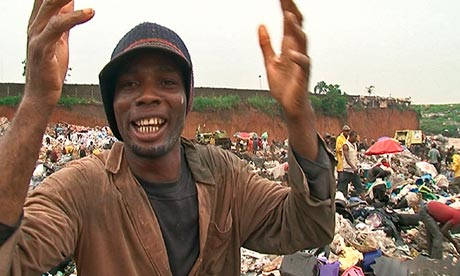I have not seen the second in the series so I can’t really say much about that. The first, though, in my opinion, does not leave any gap that needs to be filled by any fair and balanced reporting.
It is a story about a dump and its dwellers, and how they manage to eke out a living, create a semblance of a government, and work towards achieving much more than they already have.
I would actually find it distasteful if the documentary had brought in a bit of the Lekki side of life in order to show that there is more to Lagos than dumps. That would indeed smack of tokenism, and most likely remove from the main thrust of the documentary by drawing attention to the things that the dump dwellers do not have. It might also end up portraying them as victims, something that the documentary was very careful not to do.
The other question here would be whether the story would in any way be advanced by showing those other sides. I doubt it.
The documentary depicts an important part of Lagos that is almost never talked about. For that, we should be grateful.
Britain
I would assume that it is an insult to the British audience – for whom the documentary is primarily intended – for us to believe that they do not know that there is more to Lagos than dumps. Really.
There are complaints that there are Brits who live on garbage. Oh yes there are, and I could almost bet that there are documentaries on them. Probably prepared by or for the BBC. But that is not the issue here.
The issue here is that this is the story of Olusosun and not a documentary comparing it with dumps in other parts of the world. I am sure that anyone who is interested in doing a documentary on that topic – a comparison – would be able to get some funding for that.
This documentary is one that I am the better for having watched.
Libertarianism
One take on this that I find really interesting is the description of life on the dump as libertarianism in action:
Not only did the scavengers sell on any rubbish of any value, but a market arose to satisfy their own needs; the tip had a café and even a manicurist. And at the nearby cattle market, every part of the cow except the hair was used for profit; even the blood that would otherwise drain away was scooped up and turned to chickenfeed.
In this sense, we saw the free market in its perfect form: sole traders exploiting every tiny profit opportunity; the minute division of labour; hard work, energy and entrepreneurship; the lack of any waste.
We also saw that the market policed itself. The scavengers claimed that they trusted each other – though whether this was because market transactions bred bourgeois virtues, or because they threatened to burn to death suspected thieves, was unclear. What was clear, though, was that they didn’t need the state to solve their disputes.
Interesting.
Cross-posted here.

![Reblog this post [with Zemanta]](http://img.zemanta.com/reblog_e.png?x-id=57b6883b-d2be-480b-9f0d-34c9be7eb77b)